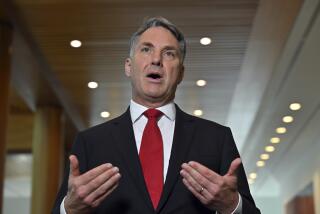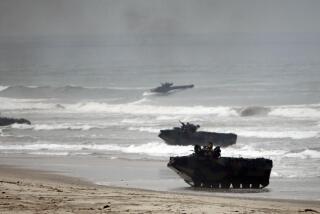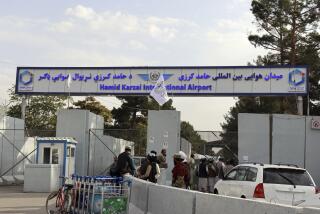Unit cleared in Afghan killings
- Share via
DURHAM, N.C. — A Marine Corps general has found that a special operations unit acted properly during a controversial shootout in eastern Afghanistan in March 2007 in which Marines opened fire along a busy highway after their convoy had been hit by a car bomb.
The number of civilians killed during the incident has been in dispute, with Afghans citing up to 19 civilian deaths and convoy members claiming they were shooting at armed insurgents.
Marine Lt. Gen. Samuel Helland determined that members of the 30-man convoy “acted appropriately and in accordance with the rules of engagement and tactics, techniques and procedures in place at the time in response to a complex attack,” according to a statement released Friday.
The unit -- the first Marine special operations company deployed in combat -- had been in Afghanistan just three weeks at the time of the March 4, 2007, incident.
After the shooting near Jalalabad, an Afghan human rights commission -- quoting local civilians and officials -- said the Marines had killed at least 12 civilians and wounded 35.
When a U.S. Army colonel told local Afghans that he was “deeply ashamed” and that the killing and wounding of “innocent Afghans at the hands of Americans is a stain on our honor,” it triggered an international uproar.
Col. John W. Nicholson, the U.S. Army commander in the area, also made cash payments to survivors of 17 shooting victims and to 25 Afghan civilians who the local Afghan governor said had been wounded.
In January, a Marine special court of inquiry looked into the incident, hearing from more than 50 witnesses over 17 days at Camp Lejeune, N.C. Among the witnesses were Afghans who testified by closed-circuit video from Afghanistan.
According to testimony before the fact-finding panel, the Marines opened fire after their convoy was struck by a car bomb that slightly injured one Marine.
Afghan civilians and local politicians accused the Marines of firing indiscriminately along several miles of highway. Marines testified that they responded to what they believed was enemy gunfire linked to the car bomb.
Lawyers for two officers who appeared at the inquiry -- Maj. Fred C. Galvin, the company commander, and Capt. Vincent J. Noble, the convoy commander -- contended that the Marines responded properly to a “complex attack,” or coordinated ambush.
In many instances, the inquiry heard vague and contradictory accounts.
An Afghan elder who said Marines shot up his car, killing his father and nephew, testified that the car was hit by “thousands and thousands” of bullets.
Several Marines said they couldn’t see much from inside their cramped Humvees yet insisted that gunmen fired at the convoy and that Humvee gunners obeyed the rules of engagement.
The Marines with the best view of events -- four men who fired their weapons -- did not testify because they were not granted immunity from prosecution.
Testimony indicated that civilians had been killed, but a firm death toll was not established.
Helland’s statement Friday referred only to “the deaths of Afghan civilians.” The general also said administrative actions related to another incident will be initiated against three officers in the unit.
Galvin will face a board of inquiry, an administrative proceeding, that will examine his actions in a separate incident on March 9, 2007, in eastern Afghanistan in which two Afghan civilians were injured and two Marine vehicles were damaged.
Court of inquiry testimony about the March 9 incident was classified and closed to the press and public.
Noble faces possible nonjudicial punishment for his actions during the March 9 incident.
The company’s executive officer, Capt. Robert Olsen, will face a board of inquiry for allegedly mishandling classified information, according to a Marine spokesman.
“Administrative, manning and training issues relative to the March 4 and March 9, 2007, incidents that were brought to light during the court of inquiry have been forwarded” to the commander of the Marine Corps’ special operations command for action, the statement released Friday said.
--
More to Read
Sign up for Essential California
The most important California stories and recommendations in your inbox every morning.
You may occasionally receive promotional content from the Los Angeles Times.














